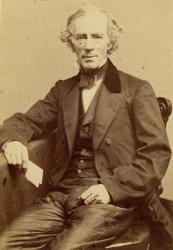Planning worship?
Check out our sister site, ZeteoSearch.org,
for 20+ additional resources related to your search.
- |
User Links
Person Results
W. A. Ogden

1841 - 1897 Composer of "[I heard a robin singing]" in Fair as the Morning. Hymns and Tunes for Praise in the Sunday-School William Augustine Ogden USA 1841-1897. Born at Franklin County, OH, his family moved to IN when he was age six. He studied music in local singing schools at age 8, and by age 10 could read church music fairly well. Later, he could write out a melody by hearing it sung or played. He enlisted in the American Civil War in the 30th IN Volunteer Infantry. During the war he organized a male choir which became well known throughout the Army of the Cumberland. After the war, he returned home, resumed music study, and taught school. He married Jennie V Headington, and they had two children: Lowell and Marian. He worked for the Iowa Normal School, Toledo Public School System. Among his teachers: Lowell Mason, Thomas Hastings, E E Baily and B F Baker, president of the Boston Music School. He wrote many hymns, both lyrics and/or music. He later issued his first song book, “The silver song” (1870). It became quite popular, selling 500,000 copies. He went on to publish other song books. Ogden also taught music at many schools in the U S and Canada. In 1887 he became superintendent of music in the public schools of Toledo, OH. His works include: “New silver songs for Sunday school” (1872), “Crown of life” (1875), “Notes of victory” (1885), “The way of life” (1886), “Gathering jewels” (1886). He was known as a very enthusiastic person in his work and a very congenial one as well. He died at Toledo, OH.
John Perry
W. A. Ogden
William Newell

1804 - 1881 Author of "I Heard the Robin Singing" in Worship and Song. (Rev. ed.) Rv William Newell DD USA 1804-1881. Born at Littleton, MA, son of a storekeeper, his family moved to Boston when he was a child. In 1814 he entered the Latin School, graduating four years later. He wrote a lengthy poem for his graduation exercise and was accepted into Harvard, receiving a BA in 1824. He taught for a year at the Latin School, then entered Harvard Divinity School, graduating in 1828. Professor Andrews Norton, who took a lasting interest in him, said his literary acumen was unequaled. He was much consulted by men of letters as a result. After college, he traveled for several months, then accepted a pastorate at the First Parish in Cambridge. In 1830 he was ordained. In 1832 a new church was built by the college across the street. He began ministry there just after a large minority of worshippers had left the church to organize the Shepard Congregational Society. Controversy in the parish between orthodox and liberal members was bitter, and the minority protested against Newell as pastor. He refused to engage in controversy and ignored all hostility. As a result of his gentleness, the quarrel soon passed into oblivion. In 1835 he married Francis Boott Wells, and they had six children: William, Frances, Robert, Kirk, Louise, and Jane. His domestic life was a happy one. Harvard conferred to him his DD degree in 1853. He remained as pastor of the First Parish until his retirement in 1868. His congregation was very diverse, consisting of academic people, retired ministers, and common folk. Somehow he managed to please most everybody through his simple and direct sermons. He wrote Bible commentaries and much verse, but never tried to publish it. He had come to Cambridge in delicate health, but managed to labor as he wished until the last year of his life, when he developed a painful illness. However, he remained cheerful and content. He died at Cambridge.
John Perry
===================
Newell, William, D.D., b. at Littleton, Mass., Feb. 25, 1804, educated at Harvard, entered the Unitarian Ministry in 1830, retired in 1868, and died in 1881. In Putnam's Singers and Songs, 1874, there are 11 of his hymns and poems. His "All hail, God's angel, Truth" (Thanksgiving), is in Horder's Worship Song, with Tunes, 1905.
--John Julian, Dictionary of Hymnology, New Supplement (1907)
William Newell
Robert Franz
1815 - 1892 Person Name: Robert Franz (1815-1892) Composer of "FRANZ" in Worship and Song. (Rev. ed.)
Robert Franz


 My Starred Hymns
My Starred Hymns


